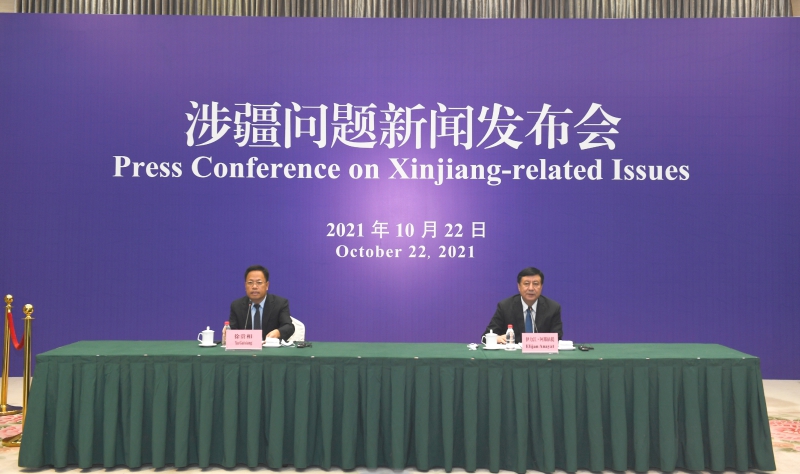
Photo taken on October 22, 2021 shows the 58th Press Conference on Xinjiang-related Issues.Photo by Xinjiang Daily/ Zhou Peng
Xu Guixiang: Good morning, fellow media reporters. Welcome to the press conference on Xinjiang related issues held by Xinjiang Uygur Autonomous Region. I'm Xu Guixiang, the spokesman of the Government of Xinjiang Uygur Autonomous Region. Sitting next to me is Mr.Elijan Anayat, another spokesman of the Government of Xinjiang Uygur Autonomous Region. Today's press conference will be presided over by two of us, and we will also connect the representatives of the general public from the grass-root level to introduce the relevant situation to you. Due to the pandemic, in addition to some media attending the meeting today, other media friends will attend and communicate with you by video conference.
Now, I'd like to present my opinions on the content of today's press conference.

Photo taken on October 22 , 2021 shows Xu Guixiang, spokesman of People’s Government of Xinjiang Uygur Autonomous Region speaks at the 58th Press Conference on Xinjiang-related Issues. Photo by Xinjiang Daily/ Zhou Peng
It’s been a while since some Anti-China forces in the United States who have wantonly fabricated the lie of "large-scale forced labor" in Xinjiang, taking it as an excuse to abuse long-arm jurisdiction and export control measures, and tried to suppress enterprises in Xinjiang and create "forced unemployment" and "forced poverty" through sanctions, so as to put the people of all ethnic groups in Xinjiang in poverty, isolation and backwardness, as well as achieve the sinister goal of bringing disaster and chaos to Xinjiang. The United States’ concocting the so-called "Uygur Forced Labor Prevention Act" will be in vain though they attempt to further intervene in Xinjiang affairs and interfere in China's internal affairs. But it is quite ironic that, these Anti-China forces only know how to blindly accuse and discredit Xinjiang, but forget that the United States is the country where forced labor really exists.
In fact, the United States has a deep and sinful accumulated malpractice on the issue of labor. Historically, the United States wantonly sold slaves and Chinese workers and bullied Indians. In recent years, the United States has deliberately evaded the responsibility of labor protection, resulting in widespread human trafficking, appalling forced labor in plantation, slavery of private prison criminals, widespread abuse of child labor, repeated violations of the labor rights and interests of women and the disabled, and continued deterioration of discrimination in job market. The US is truly an alive example of "Modern Slavery".
Next, let’s take a look at a group of pictures.
The United States has been claiming that there is a phenomenon of "large-scale forced labor" in Xinjiang, which is not in any way in line with the reality of the situation of the labors of all ethnic groups in Xinjiang. It is completely a lie fabricated out of void by some western institutions as well as anti-China activists and individuals. As for "forced labor", the Convention on Forced Labor adopted by the International Labor Organization has a clear definition, which refers to "forcing anyone to engage in all work and services that he has not expressed his willingness to engage in by threat of punishment". In Xinjiang, the labor rights and interests of the people of all ethnic groups are protected by China's Constitution and laws. Workers all have the freedom to choose their careers. They can go wherever and do whatever they want, and their personal freedom has never been restricted. Their customs, religious beliefs and the uses of their own national languages are also protected according to law. Besides, relevant enterprises have also provided them with good working and living conditions to ensure that they are comfortable at work, at ease in life and at safe with their families. There is no "forced labor" at all.
Today, we are here to hold a press conference on Xinjiang related issues, with a main goal of reviewing the history of the United States, taking a look at the reality of the United States, revealing the existence of forced labor in the United States, and striking on this self proclaimed "human rights defender".
Xu Guixiang: In the history of the United States, it is notorious for slave trade and forced labor. Today, there is still a widespread "modern slavery". Many immigrants have been trafficked to "factories of blood and sweat". The ugly and evil doings such as forced labor and exploiting the labor have emerged one after another. Now, Mr. Elijan Anayat has been invited to give a brief on the situation.
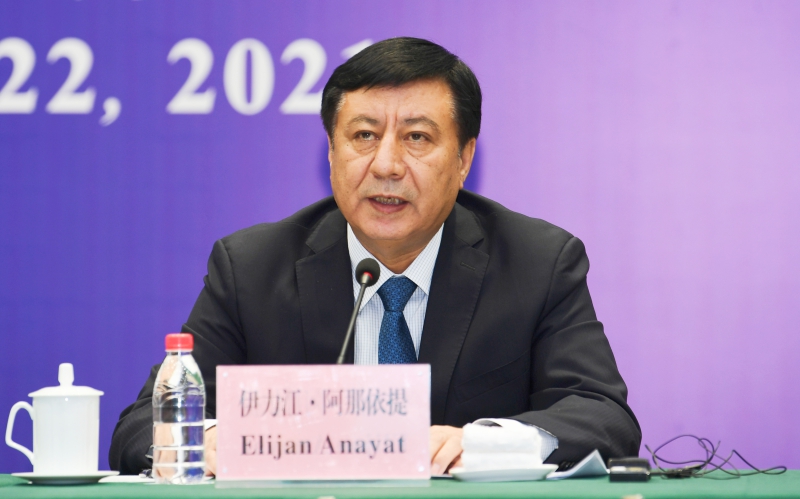
Photo taken on October 22, 2021 shows Elijan Anayat, spokesman of People’s Government of Xinjiang Uygur Autonomous Region speaks at the 58th Press Conference on Xinjiang-related Issues. Photo by Xinjiang Daily/ Zhou Peng
Elijan Anayat: As we all know, the United States has a history of trafficking, abuse and discrimination against black slaves for hundreds of years. According to relevant historical records, from the first batch of slaves in 1619 to the abolition of slavery in 1865, a large number of black slaves were trafficked to the United States as forced labors. According to the data of Statista Research Company in Germany, there were nearly 700,000 black slaves in the United States in 1790, while by 1860, there were more than 3.95 million black slaves in the United States. According to statistics, the labor value squeezed by American slave owners from black slaves was as high as $14 trillion at current prices. Many of these black slaves were forced to engage in the cotton industry, and the American cotton industry was also stained with the blood and tears of these black slaves. As the American writer Edward Baptist said in his book "The Covered Original Sin: Slavery and the Rise of American Capitalism", the whip drove the slaves to devote all their physical strength and most of their energy to cotton picking, which made the cotton picking speed faster and faster. Under the severe pressure of slave owners, by 1860, the cotton production in the United States had reached 130 times that in 1800.
Next, let’s take a look at a set of comics.

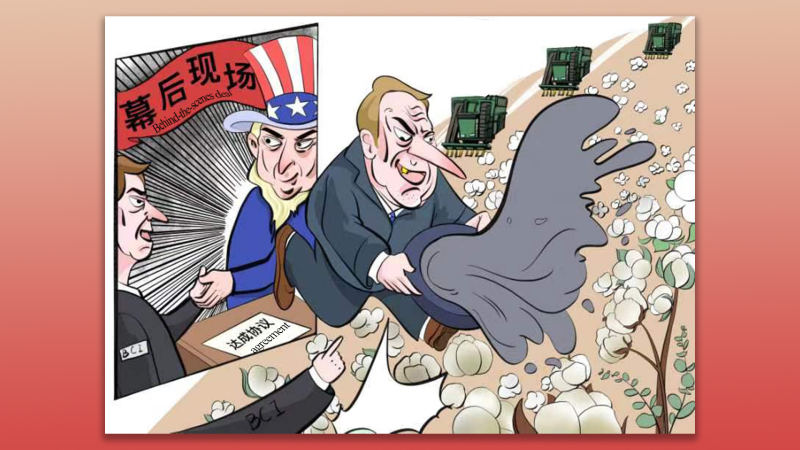

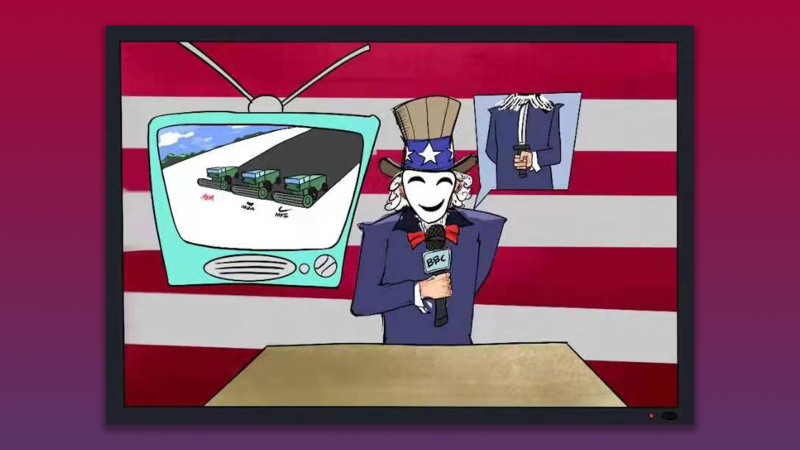
Even until now, the United States, which started its progress from a long-term bloody slave trade, still has not changed its "dark tradition", and it continues to indulge the "dirtiest criminal act" of human trafficking, and the victims have changed from black slaves to "immigrants". As Laurel Fletcher, a professor at the center for Human Rights Studies at the University of California, Berkeley, said, the public generally believes that the United States has long solved the problem of modern slavery, but in fact, modern slavery still exists and is very common. It just appears in a new form. According to relevant statistics, in the past five years, all 50 states in the United States and Washington, D.C., have reported cases of forced labor and human trafficking. Every year, as many as 100,000 people are trafficked from abroad to the United States as forced labor, half of which are trafficked to "factories of blood and swear" or subjected to domestic slavery. According to the statistics of the non-profit organization "Polaris Project", from the end of 2007 to the end of 2019, the "National Human Trafficking Hotline" in the United States has received a total of 63380 cases, including 11500 cases in 2019, involving 22,326 victims. Although these figures are shocking, they may be only a small part of reality. In the face of a series of figures with "blood and tears", the U.S. State Department has to admit that the United States is a country of origin, transit and destination for victims of forced labor and slavery. There is human trafficking in both legal and illegal industries, including commerce, hotel industry, tourism, agriculture, domestic services, construction, restaurants, massage parlors, begging, drug smuggling, etc. These victims include both national citizens and foreign citizens from almost every region of the world, even vulnerable groups such as women, children and the disabled.
Looking into the rampant problem of human trafficking in the United States, the huge profits of criminal groups are the superficial cause, and the frequent "Absence" of U.S. law enforcement agencies and judicial system is actually a more important reason. According to the research report released by the American Urban Institute and Northeastern University in 2014, U.S. law enforcement agencies often do not help victims of forced labor, and sometimes even stand on the side of human traffickers. For example, in one case, a farmer opened fire on a farm worker who has been forced to work and was trying to escape. Then, when the police arrived, they arrested the farm worker on charges of illegal immigration. Usually, victims are unable to prosecute traffickers, and most lawyers are unwilling to take the time to help them, resulting in that they are often not paid or compensated for abuse. Chris Barkley, a scholar at the University of Denver in the United States, also pointed out that the reason why forced labor in the United States is difficult to eradicate is that, on the one hand, it is profitable, on the other hand, it is due to weak legislation and inefficient law enforcement in the United States, and the risk of perpetrators being prosecuted is very small. The most common areas of forced labor are housekeeping, agriculture, industry and pornography, which have a high demand for cheap labor. U.S. law requires little or no regulation of working conditions in these areas.
Now, let’s watch a video clip from the American TV film America: Our Story.
Xu Guixiang: Forced labor is a common problem in American agriculture. Those immigrants are poor and suffer inhuman treatment under the oppression of farmers. Now, let me introduce this situation to you.
Xu Guixiang: American agriculture is the most serious field of forced labor. Farm workers are excluded from American labor legislation, and their basic rights are not protected. According to statistics, 30% of farm workers and their families live below the federal poverty line. They have difficulties in expressing their own demands, often subjected to threats or violence and forced labor.
The labor rights of American farm migrant workers have been seriously violated. The vast majority of farm workers in the United States are male immigrants, many of whom are not registered and may be deported at any time. According to the report "By No Means Hospitality" released by "Farm Workers’ Justice" organization, American farmers do not need to pay social security and unemployment insurance for seasonal migrant workers, and they also have low labor costs, maliciously deduct wages, implement debt slavery, racial discrimination, and do not have guaranteed basic accommodation and a safe workplace. Because they can't speak English, they know nothing about labor rights. Yet they are also afraid of being deported, so all they can do is to swallow their anger in the face of employer exploitation. For example, Imokali, a small town in Southwest Florida, is known as the "Town of Tomato" of the United States. The town has a total of 26,000 people, most of whom are peasants from Mexico, Guatemala, Haiti and other countries. The local minimum wage is $8.65 an hour, but they can only earn $5.50 an hour, far from reaching the minimum wage. For another example, Buzzfeed, a famous American news website, reported that in 2011, two Spanish women were hired to work on the farm of an owner named West. They were confiscated their passports and visas, and were often sexually assaulted by the owner. Their living environment was also extremely poor, with no clean drinking water, and the place was full of rats and bedbugs, dirty and smelly. The farmers promised them $9.1 an hour, but in fact they got less than $4 an hour. As described by Anti-Slavery International, farm workers are "the lowest paid and most exploited workers in the American economy". These people lack the rights enjoyed by other American workers. They often work without medical insurance, sick leave, pension or job security, which is the fertile soil for forced labor in American fields.
Xu Guixiang: Forced labor in private prisons in the United States is quite staggering. Some employers in the United States regard prisoners in private prisons as cheap labor forces to deal with the labor shortage in their industries, so as to obtain high profits. Now, let me introduce this situation to you.
Xu Guixiang: Forced labor in America's private prisons has a long history. In the 1980s, because the United States government launched a large-scale anti-drug campaign, the number of criminals reached a record high. Public prisons are overwhelmed, so the solution was to build privately funded prisons with government subsidies. Meanwhile, the private prison industry is expanding rapidly as high crime rates, surging illegal immigration and tougher sentencing standards continue to drive up the number of criminals across the United States. According to statistics in 2019, there are more than 200 private prisons in the United States, holding nearly 120,000 prisoners for the government.
In private prisons, criminals are treated as cheap labour. They are forced to be involved in a multitude of daily chores, including storage, maintenance, ground handling and food service. In addition, their work hours are long, the working conditions are bad, and their pay is low. During the COVID-19 pandemic in 2020, prison administrators asked inmates to transport the bodies of COVID-19 patients. During the California wildfires, prisoners were sent to the front lines. Prisoners who refuse to work will be faced with the scourge of torture, detention, effect on commutation and other punishment. Moreover, private prisons have become a base for production and processing by combining with a number of companies and institutions. Because labor costs are so low and there are no unions, American companies large and small are willing to join forces with private prisons. By 2020, masks, hand sanitizer and other products made in private prison factories were worth millions of dollars. Although prisoners risk their lives for these jobs, they are paid, on average, between 12 cents and 63 cents an hour, and as much as $2 an hour, far less than the legal minimum wage of $15 in the United States today. Forced labor in private prisons is a serious problem, with prison operators making a fortune while prisoners suffer physical and mental abuse and suffering. It follows then that America's private prisons have become "living hell".
Forced labor in private prisons in the United States is an "unique scenery" of "modern slavery", and there are very complicated political, legal and interest behind it.
The first one is the political cause. In order to keep making more money, reduce costs and maximize profits, private prisons in the United States make political donations in every way possible, spending huge sums of money on political candidates and lobbying every year. CCA and GEO, two of the largest private prison operators in the US, spent $14.6m on funding and lobbying campaigns between 2010 and 2015. The American Legislative Exchange Council, which claims to be committed to limiting government power and defending the free market, accepted a lot of help from CCA behind the scenes. Through the American Legislative Exchange Council, CCA has been able to influence criminal policy nationwide, including the privatization of prisons and the rapid increase in criminal convictions. The American Legislative Exchange Council has implemented a number of policies that have increased both the number of people incarcerated and the length of their sentences.
The second one is problems relating to legal procedures. In 1865, the United States Congress passed the 13th Amendment to the Constitution, stating that slavery or servitude by forced labor shall not exist in any jurisdiction of the United States, except as a punishment for a criminal. But the 13th Amendment has been called one of the strangest laws in American history because it made slavery illegal, but left a big loophole that slavery was not illegal when it was used to punish criminals, which led to the legalization of slavery under conditions of imprisonment. At the same time, private prisons in the United States are trying to get rid of the constraints of the policy and law by way of bribery to get more prisoners in “legal ways”. Thus they can make forced labor in prisons and detention centers a “legal business”. For example, in 2010, Arizona's new illegal immigration law made it possible to detain people suspected of being illegal without trial. For another, in 2018, the US Department of Justice announced a "zero tolerance" policy for illegal immigration, once again strengthening the criminal prosecution of those who enter the US illegally
The third contributing factor is interest. In the United States, where the crime rate is constantly rising, private prisons were originally established to help public prisons relieve the pressure of overcrowding. However, driven by interests, private prisons soon developed into a full-fledged interest group through unrestrained exploitation of prisoners. As Frank Smith, an opponent of private prisons in the United States, puts it: “They (private prison owners) are millionaires. While jailers are paid peanuts, their employers are making millions of dollars a year.” For example, private prisons have contracts with the government so that they can get an extra sum of money for every extra inmate every day. Moreover, if there are 10% rooms that are not occupied, the government has to pay for them. For another, CCA makes a lot of money by signing contracts with the government, forcing prisoners to work on so-called "voluntary work programs" and squeezing operating costs. However, this company went public in 2000, and the company's profits increased 500-fold in 20 years.
Now, let’s watch a video which comes from CCTV. It reflects forced labor in private prisons of the United States.
Xu Guixiang: The US has been infamous for abusing child labor. Children are supposed to be innocent and happy. However, on cotton farms in the United States, many children suffer inhumane treatment. Let me tell you something about it.
Xu Guixiang: As the most developed country in the world, the United States is the only country in the world that has not ratified the United Nations Convention on the Rights of the Child. The child labor issue is serious under the so-called “beacon”. The nonprofit American Migrant Worker Opportunity Program Association estimates there are about half a million child laborers working in agriculture in the United States.
First, American legislation acquiesces in the use of child labor in agriculture. The Fair Labor Standards Act (FLSA) states: "Young workers must work in a manner that is safe and does not jeopardize their health, well-being or educational opportunities. Children are protected from working in offices and factories ". As can be seen from the provisions of the law, the agricultural sector is not included in the scope of protection, which leads to a large number of child labor problems in this field. For example, the minimum age for agricultural work is 12 years old in 50 states, which is much younger than it in the factory. Even in some states(for example, Oregon), the government allowed 9-year-old children to pick berry. This apparently contradicts International Labour Organization rules limiting hazardous work for children under 15 years old.
Second, the lives and health of child laborers in the United States are destroyed in the process of labor. According to official statistics, American law enforcement officials found 858 cases of child labor violations under the Fair Labor Standards Act in 2019, and 544 minors were found working in hazardous workplaces. Child Labour in agriculture is at risk of pesticide poisoning, fever, injury or permanent disability which is derived from operating knives and heavy equipment. For example, the Washington Post reported that between 2003 and 2016, 452 children died from work-related injuries in the United States, including 237 child laborers who died in agricultural accidents, which is many times the number of deaths in other industries. For another, according to the Atlantic Monthly, tobacco farms in several states employ a large number of children to harvest and dry tobacco leaves, and even operate heavy machinery. Working on tobacco farms can be extremely harmful to children's physical and mental health. It is reported that children had general nausea and headaches, which are the symptoms of nicotine poisoning. They were even found to have lung infections.
Third, the abuse of child labor in the United States has been widely criticized by the international community. During the 103rd International Labor Conference in 2014, the International Labor Standards Implementation Committee listed the violation of the Convention on the prohibition and immediate action for the elimination of the worst forms of child labour by the United States as one of the key national cases and reviewed it at the meeting. The ILO Committee of experts on the implementation of conventions and recommendations has continuously commented on the issue of child labour in the United States for many years, repeatedly expressed concern about a large number of serious industrial accidents caused by child labour in American farms, urged the U.S. government to formulate measures to strengthen the supervision of the use of child labour in agriculture and provide detailed statistical data on child labour in agriculture, In particular, the number of work-related injury cases and the investigation and handling of cases of illegal use of child labour. In June 2021, at the video conference of the 109th International Labour conference held in Geneva, the forced labor and child labor in the United States were widely condemned by the participants. Many analysts believe that the actions of the United States have exacerbated the global problem of child labor, and they bear unshirkable responsibility for this.
Next, let’s watch a video, reflecting the situation where children in the US are subjected to forced labor.
Xu Guixiang: The problem of gender discrimination in the US is very serious, especially in the field of labor employment. American women have been subjected to long-term, systematic, extensive and institutional unfair treatment, and various public and hidden discrimination are shocking. Let’s give the floor to Elijan Anayat to introduce the relevant situation.
Elijan Anayat: The elimination of gender discrimination and the realization of equality between sexes is an important symbol of the progress of human civilization. But in the US, the situation of women in the field of labor employment is very worrying. The US has yet to ratify The Convention on the Elimination of All Forms of Discrimination against Women so far, a core human rights convention in the United Nations, which seriously hinders the realization of women’s human rights. According to statistics, women account for more than 46% of the total labor force in the US, but they face serious employment discrimination and workplace discrimination.
Firstly, the issue of unequal pay between men and women for the same work is prominent. Gender income gap is a “convention” in the American workplace, especially in recent years, when the issue of income gap between men and women in the US has become increasingly prominent. According to the data released by the US Census Bureau, the income gap between men and women has remained at about 21% for years, and in 2018, the annual wage income of American women was only 81.3% of that of men. On December 16, 2019, the website of Louisiana Weekly also reported that more than 40% of women said they had experienced gender discrimination at work, couldn’t get equal pay for the same work or promotion.
Secondly, the unemployment rate of women is significantly higher than that of men. Affected by the US economic recession, women have been hit particularly hard by unemployment. According to the employment report released by Bureau of Labor Statistics, the US lost 54,300 retail jobs between October 2016 and October 2017, but what men and women encountered were entirely different. Women lost more than 160,000 positions, while men gained 106,000 more positions. On May 25, 2020, citing data from Bureau of Labor Statistics, US Capitol Hill daily reported that in April of that year, the employed population of the non-agricultural sector in the US decreased by 20.5 million compared with last statistics, of which unemployed women accounted for 55%, 10 percentage points higher than men.
Thirdly, the pregnant and lactating women are discriminated against. The US is the only industrialized country that does not have legislation explicitly stipulating paid maternity leave. The domestic legislation Pregnancy Discrimination Act is nothing but empty words, and forcing pregnant female employees to leave their jobs frequently occurs. According to the data in 2019, the number of complaints, that US Equal Employment Opportunity Commission received every year, about the discrimination against pregnant women has risen steadily over the past 20 years, and remains at an all-time high. On February 8, 2019, the website of New York Times revealed that discrimination against pregnant women was widespread in large companies in the US. Also, it’s common to refuse to hire pregnant women or give them raises, and the employees will be dismissed if they complain.
Fourthly, sexual harassment of women in the workplace is common. Women in the US not only face discrimination in employment, payroll and promotion, but also encounter obscenity and even sexual assault in the workplace, and they suffer from mental torture. According to the report released in 2017 by US Equal Employment Opportunity Commission, 60% of women have experienced sexual harassment at work. Since many victims are afraid to file charges for various reasons, the actual number of women who have suffered sexual harassment and sexual assault is likely to be higher. According to the industry-wide surveys, 94% of women surveyed said they had experienced some form of sexual harassment or sexual assault during their careers. In October 14, 2018, Des Moines Register reported that more than 20 members of parliament or parliamentary staff were involved in sexual harassment cases in Iowa, and the victims had had to remain silent for more than a decade for fear of losing their jobs or retaliation.
Xu Guixiang: In the US, inequality and discrimination have penetrated into all aspects of society, especially the cases of discrimination against the disabled occur from time to time, and their employment rights are not guaranteed at all. In this regard, I let me give you more details.
Xu Guijiang: As a social vulnerable group, the discrimination and prejudice against Americans with disabilities in employment are even more appalling. The United States has refused to ratify Convention on the Rights of Persons with Disabilities from the United Nations so far, which makes the labor and employment rights of Americans with disabilities unable to be effectively guaranteed.
For years, the employment rate of Americans for the disabled has showed an ongoing declining tendency, while the unemployment rate of them increases constantly, and it’s often harder for them to find stable jobs and to earn wages above the poverty line. According to census data, in 1990, about 50% of Americans with disabilities had jobs, but by 2020, this number had dropped to 41%. In July 26, 2019, the website of Center for American Progress reported that one in every four people with disabilities faced difficulties in employment and getting paid, and the high unemployment rate worsened the income and living conditions of persons with disabilities. In August 9, 2019, the website of US National Broadcasting Company reported that, according to the data released by Equal Employment Opportunity Commission, employees with disabilities were fired at nearly twice the rate of the employees without disabilities. In 2017, the federal government laid off 2626 full-time disabled employees, an increase of 24% over 2016. According to the statistics in 2015, people with disabilities earned $9,000 a year less than those who without disabilities, and the gap continued to widen. In 2019, affected by COVID-19, the employment situation of Americans with disabilities was even worse, which deprived them of their source of income, and their poverty rate was almost twice that of normal persons.
Xu Guixiang: In recent years, the violations of labor rights and interests in the US have occurred constantly, and social conflicts have increasingly intensified. However, the US government deliberately shirks its responsibility for labor protection and refuses to sign core international labor conventions, which is seriously inconsistent with its image as a so-called “human rights lecturer”. Let’s give the floor to Elijan Anayat to introduce the relevant situation.
Elijan Anayat: The US often talks about “human rights first” and “international rules”. But in fact, it’s the US itself that has flouted international rules and violated labor rights and interests. The US is not qualified to be “human rights lecturer” at all.
From the evaluation of the international community, the US has been heavily criticized for its lack of protection of labor rights and interests. The relevant report of International Trade Union Organization shows that the systematic violations of labor rights exists in the US, and US performs the worst among major developed countries. On June 10, 2015, the International Union of Trade Unions released a report that the US was listed as one of the countries that systematically violated workers’ rights. In May 2018, the UN Special Rapporteur on Extreme Poverty and Human Rights released a report pointing out that the US social security system was flawed, with one quarter of full-time workers and three quarters of part-time workers receiving no paid sick leave. In June 2021, American labor issues were widely criticized at the International Labor Conference.
From the aspect of ratification and implementation, the US, which always flaunts a sound labor legal system, has ratified only 14 international labor conventions so far. There are 8 core labor conventions in the world, but the US has ratified only 2 conventions and it’s the country who ratifies the least. In particular, the US has not signed any of the three important legal documents directly related to the issue of forced labor, such as Forced Labor Convention, Supplementary Protocol to the Convention on Forced Labor and Convention concerning the Abolition of Forced Labor, which coincides with the long-term bad record of the US in forced labor and violation of labor rights.
From the reflection of the American workers, in recent years, strikes by workers in various industries due to dissatisfaction with the working environment and salary have occurred frequently. On February 1, 2015, the website of Al Jazeera American channel reported that about 3,800 refinery workers at 9 factories in California, Texas, Kentucky and Washington went on strike on that day because of the intolerable overtime, the insecure positions and the dangerous working environment that enterprises continued to ignore. Strike leaders said that these enterprises might have fires, the leaks of emissions and explosions every day, threatening the local community, but the enterprises did not take any measures. In addition, employees who engaged in fast food, home care and day care also planed to join the protest. Especially since October 2021, the patience of American workers had reached its limit. Many US media reported that more than 100,000 workers in various industries in the US, from workers on the machinery and food production lines in the US, to nurses in Massachusetts and winemakers in Kentucky, to staff in Hollywood, were either on strike or preparing to. According to the experts in the US, wages and welfare benefits for many American workers are still the same as they were 40 years ago, and especially with the COVID-19 pandemic and inflation, many low-income workers’ family lives has been heavily devastated. In addition to economic reasons, American workers also get far less vacation time than in other developed countries; some America workers feel that they are not respected by the employers or customers; and many American workers also think that working under COVID-19 without adequate protection could kill them at any time.
Facing the criticism of the international community and the protests from domestic workers, the US not only does not reflect on itself, but arbitrarily blames other countries in an attempt to divert attention, mislead public opinion, and even abuse its long arm jurisdiction and impose unreasonable sanctions based on false facts. This practice can only show the world once again the extremely hypocritical and ugly face of the US. Vilifying others can not beautify themselves, but will only make their own image worse and worse. We advise the US to stop political manipulation on the labor issue, take a good look in the mirror, face up to and solve its own problems. Applying “double standard of human rights” blindly will only make things worse and only add to international ridicule.
Xu Guixiang: Although the above content is only the tip of the iceberg of human rights violations in the field of labor and employment in the US, it is enough to make the whole world be aware that the US is the biggest producer of the issue of human rights. However, such a country often attacks the employment situation in Xinjiang on the context of “human rights violations” and imposes unreasonable sanctions on relevant enterprises. From smearing and sanctioning Xinjiang cotton to slandering and suppressing Xinjiang photovoltaic enterprises, each time in the name of so-called “human rights”, the US practices protectionism and bullying practices. In July this year, the US Department of Commerce also played dirty tricks on information technology industry in Xinjiang, and listed 6 Xinjiang enterprises on “entity list”, which severely damaged the enterprises’ reputation and interests. Next, let’s contact some of the enterprises leaders, and hear their voice.
First of all, let’s contact Jin Zhiqiang, the president of Urumqi Tianyao Weiye Information Technology Service Limited Company, who will introduce the relevant situation.
Jin Zhiqiang:Based on the so-called “human rights violations and high-tech monitoring”, the U.S. Department of Commerce included the Urumqi Tianyao Weiye Information Technology Service Co., Ltd. in the “entity list” and and carried out unreasonable crackdown and sanctions on it. Such despicable and vicious behaviour built on lies is what arouses our strong indignation and resolute opposition!
Urumqi Tianyao Weiye Information Technology Service Co., Ltd is an intelligent technology service enterprise focusing on the research and development of software products. The company boasts the core technology of many intelligent IOT solutions and the intellectual property rights for independent R&D. Since its establishment in 2012, the company has been committed to becoming the best provider of intelligent technology service in China, using digital information to build a social-wide security network so as to create a harmonious and stable living circumstance. After years of development, our company has formed outstanding system integration and found advantages for ITSS operation and maintenance service in Xinjiang, providing users in many fields with advanced intelligent technology services and all-round professional services such as ITSS operation and maintenance, so that more enterprises and individuals in Xinjiang can benefit from the high-efficient working mode and embrace new life experience brought by artificial intelligence technology. With long-term and stable after-sales service, our company has won the trust and good reputation from the majority of users in Xinjiang.
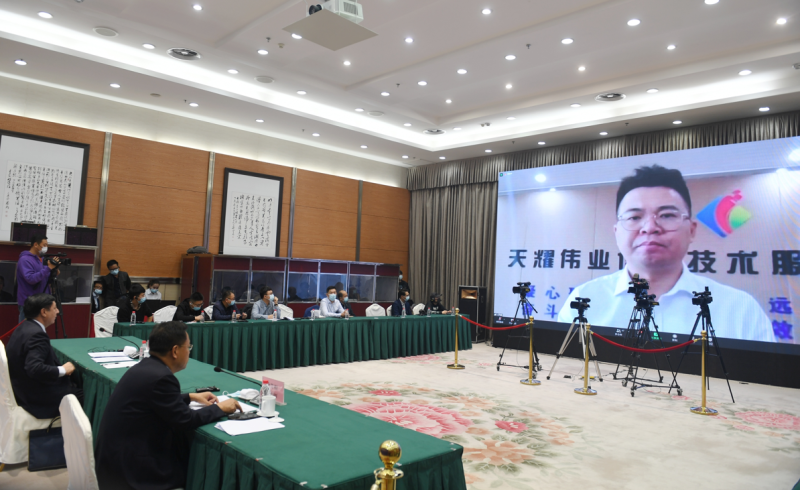
Photo taken on October 22 , 2021 shows Jin Zhiqiang speaks at the 58th Press Conference on Xinjiang-related Issues via online video. Photo by Xinjiang Daily/ Zhou Peng
The company has been producing and operating in accordance with laws and regulations. It not only abides by business ethics but actively performs social responsibilities. With research and development of core technologies such as smart city, the company promotes the application of modern scientific and technological products as well as big data methods. By doing so, it helped enhance social security and improves the level of social governance, which is also a common practice in the international community. Our company's technology and services are never directed against any specific ethnic group, but aimed to better safeguard the basic rights and interests of people of all ethnic groups in Xinjiang, such as the safety of life and property. However, the United States falsely called Xinjiang's measures to improve social governance by using modern science and technology as "human rights violations and high-tech monitoring", such behavior proves nothing but US’s "double standard". What the United States claimed is groundless. It is completely malicious smear and political manipulation, which is just despicable. The fact is that the United States is trying to abuse state power to suppress high-tech enterprises in Xinjiang as a way to undermine stable development of Xinjiang.
In conclusion, we firmly oppose the terribly wrong decision made by the U.S. Department of Commerce, we reject any unfair and unreasonable punishment, and we refuse the politicization of trade issues. Of course, our company will not be afraid of America’s interference with power and will reserve the right to solve problems by all legal means. At the meantime, our company will also continue to be an enterprise that burdens social responsibility, forges ahead to benefit the people and repay the society with better services.
Next, we'll connect Mr. Wang Jineng, vice president of Xinjiang Sailing Information Technology Co.,Ltd. and invite him to talk bout the situation.
Wang Jineng: It is extremely irresponsible for the US Department of Commerce to impose sanctions on our company without any factual basis. Such politicization of business activities and scientific and technological R&D seriously violates the basic norms of international relations and damages the reputation and interests of our company. And we are here to express our strong indignation and firm opposition to such behavior!
Founded in 1999, our company is a legally registered enterprise whose production and operation have been in accordance with laws and regulations. Our company has been faithfully performing its social responsibilities, scrupulously abiding by business ethics and following relevant national laws and regulations. And we have been carrying out R & D and offering services in line with domestic and international industry standards. Also, our products applied in smart cities, smart tourism, smart parks, smart airports and other scenarios are aimed to reduce customers’ costs to improve economic efficiency. With scientific methods, we seek to create value and improve social governance. That is how we improve the sense of security of people of all ethnic groups. So our products are not directed against any specific groups, let alone committing "human rights violations and high-tech monitoring".
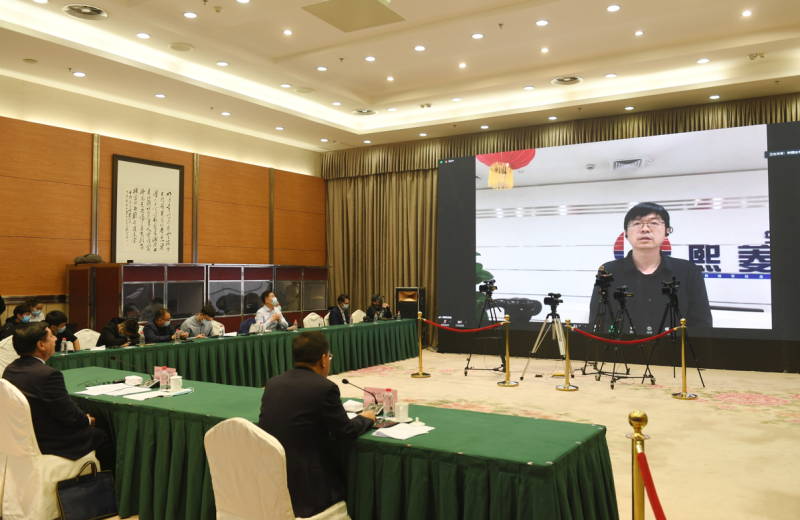
Photo taken on October 22 , 2021 shows Wang Jineng speaks at the 58th Press Conference on Xinjiang-related Issues via online video. Photo by Xinjiang Daily/ Zhou Peng
Guided by industrial demand, we will gather more scientific research wisdom and strengthen independent innovation. That is how we continue to provide customers with stable and high-quality services with professional and reliable technologies and products. The more blockade and pressure there is, the faster development we want. So the unreasonable sanctions of the U.S. Department of Commerce means nothing to us! We will resolutely safeguard our legitimate rights and interests through legal means, and urge relevant U.S. agencies to respect the facts and abandon prejudice, it is time to stop the political manipulation and sanctions so as to eliminate negative effects.
Next, let's connect Liu Fei, the account manager of the Digital Sales Department of Leon Technology Co., Ltd., and invite him to talk about the relevant situation.
Liu Fei: I am Liu Fei, the customer manager of the Digital Sales Department of Leon Technology Co., Ltd.. On July 9, 2021, the US Department of Commerce included our company in the "entity list" on the grounds of "human rights violations and high-tech monitoring". I felt puzzled about it and found it ridiculous. And here I am to express my strong dissatisfaction and firm opposition.
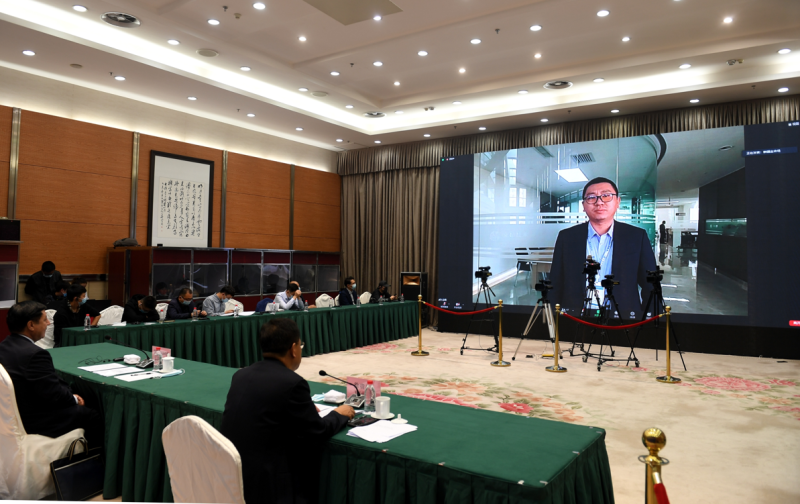
Photo taken on October 22 , 2021 shows Liu Fei speaks at the 58th Press Conference on Xinjiang-related Issues via online video. Photo by Xinjiang Daily/ Zhou Peng
Under the context of market-oriented economy, only by complying with the law and regulations in good faith, can enterprises become more solid, better, bigger and stronger. That is why our company has been holding the business philosophy of "managing enterprises according to laws and regulations, strengthening management and improving quality". And our business mainly focuses on digital city system services, IDC data center and cloud computing services, value-added for services telecom operator and communication network technology services. All these businesses are aimed to better serve the society and the people of all ethnic groups in Xinjiang. So how can one call it "human rights violations" when we try to provide digital, intelligent and convenient service systems for everyone?
The US Department of Commerce has included our company in the "entity list", which is a totally hegemonic act with no factual evidence as support. And the United States' act of using lies to exercise hegemony can only end up with being "the dishonest who will receive no help or support".
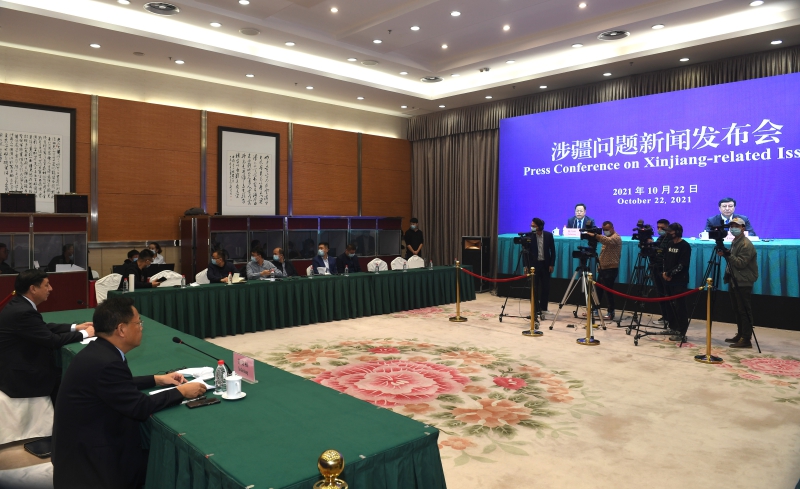
Photo taken on October 22, 2021 shows the 58th Press Conference on Xinjiang-related Issues.Photo by Xinjiang Daily/ Zhou Peng
Xu Guixiang: Next, let's have an exchange on the relevant issues.
Cable News Network (CNN): China's official media recently reported that the CBA player Hu Mingxuan who is a member of Xinjiang Basketball team was punished for endorsing Adidas, for Adidas had smeared the cotton industry in Xinjiang. What is your comment on this incident? Is Adidas a Anti-China brand to Xinjiang government? Can Chinese athletes, especially those from Xinjiang, cooperate with this brand in future?
Xu Guixiang: Let me answer this question. Based on false information, some western enterprises such as HM, Nike, Adidas blindly made the decision to boycott cotton in Xinjiang. But what happened? It is nothing more than their loss of the Chinese market, Chinese customers and their own reputation. Regardless of the factual basis, these enterprises are spreading rumors against cotton in Xinjiang and, at the same time, trying to make money from the Chinese people! What a wishful thinking!
With the development of science and technology, cotton production in Xinjiang is now highly mechanized. Even in the busy picking season, there is no need for a large number of "working pickers". For example, machines has been applied to harvest most cotton in Bayingol Mongolian Autonomous Prefecture, Xinjiang since 2015. So why do we need to "force" people to work when there are efficient machines? So the report from western Think Tanks is purely subjective and groundless. What’s more, at the Press Conference on Xinjiang Related Issues held in Beijing on October 11, we also had a live connection with a cotton farmer in Xinjiang. And We all saw how the cotton is harvested there. The wide cotton fields and large cotton blossoms cannot lie.
Now, next question, please.
China News Service: It is noticed that some local governments in Xinjiang have restricted Muslims from practicing worship, and some even require that Muslims can only go to worship for no more than ten times a month. Is the number of worshippers in mosques in Xinjiang more or less compared with that in previous years? What caused this change?
Xu Guixiang: Mr Elijan Anayat will answer this question.
Elijan Anayat: Xinjiang has never restricted Muslims from doing worship, let alone setting limits for times for Muslims to go to mosques. On the contrary, Xinjiang fully implements the policy of freedom of religious belief and guarantees the normal religious activities and religious needs of religious believers in accordance with laws. In Xinjiang, all legal religious activities carried out by religious believers in places of religious activities or in their homes in accordance with religious customs, such as worship, fasting and religious festivals, are taken care of by religious organizations and religious believers themselves. All these activities are protected by law and no organization or individual may interfere.
Now, next question please.
Xinjiang Daily: Recently, the Australian Strategic Policy Institute issued a report again, falsely claiming that "Xinjiang uses a large-scale data collection system to investigate millions of Uygurs, and the Chinese government implements a genocide policy in Xinjiang through political campaigns". What’s your comment about it?
Xu Guixiang: I will answer this question. The “Australian Strategic Policy Institute” has been long receiving financial support from the US government and arms dealers, spreading rumors everywhere to vilify and demonize China for the benefit of his financiers; Especially on Xinjiang related issues, it has repeatedly thrown out fallacies that are groundless and full of prejudice. The “institution” is essentially in line with the US anti-China forces to slander and discredit Xinjiang's efforts on anti-terrorism and de-extremism. Its biased position has been criticized by people in Australia, and its academic reputation has also been seriously questioned. Geoff Raby, the former ambassador to China, regarded the “institution” as "the chief designer of Australia's “China Threat Theory”; Bob Carr, the former Governor of the New South Wales, said the “institution” threw out a “world view that is one-sided and pro-American”; John Menadue, the former Chief Executive Officer of Qantas, also recognized that the institution’s “lack of honesty humiliated Australia”.
So the so-called”genocide” in Xinjiang is completely an attack framed against China. There are at least two features for the definition of Genocide: population reduction and physical destruction. However, according to the actual situation, since the founding of the People’s Republic of China in 1949, the population of Xinjiang, especially the population of ethnic minorities, has been increasing rapidly, the quality of the population has been improved, and the averaged life expectancy has also been extended significantly. What’s more, the Uygur population increased from 3,607,600 in the first national census in 1953 to 11,624,300 in the seventh national census in 2020. Today, Xinjiang enjoys an all-round economic and social development, the overall social situation remains stable, the people of all ethnic groups live and work in peace and contentment, and the population is characterized by a balanced and healthy development. Now, what kind of "genocide" is this?
Xu Guixiang: That's all for today's press conference. Thank you all, speakers and friends from the media.








